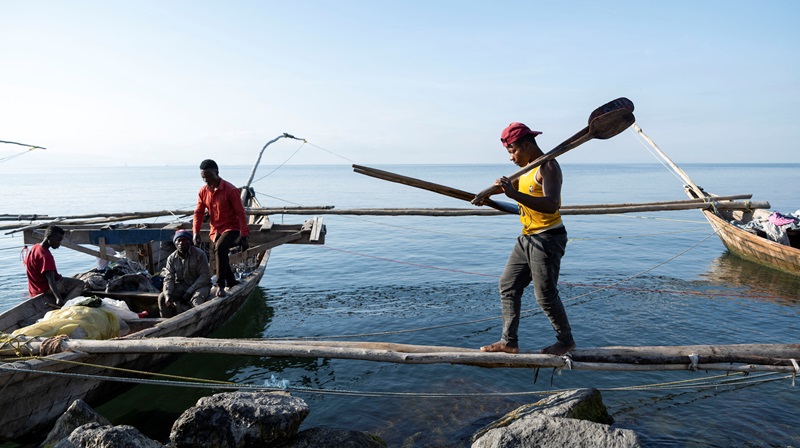The technically complex contract was won by Alfajiri, which is based in a residential property in Canada and has only existed a few months
A Canadian start-up run from a private home was chosen by Democratic Republic of Congo for a technically complex project to extract methane from the deep waters of a volatile lake, despite the company not meeting the tender’s financial criteria, documents seen by Reuters show.
President Felix Tshisekedi, who is seeking re-election in December, has promised to shake off Congo’s reputation for opaque dealings as he pushes plans to develop dozens of oil and gas blocks – many of them in environmentally sensitive areas.
First to be auctioned were three methane blocks in Lake Kivu, sometimes dubbed a “killer lake” because of a risk of deadly eruption. The extraction project aims to supply gas for power generation, including to hundreds of thousands of people living on the lake’s shores.
The auction, which took place last year, was the first of its kind to be conducted in Congo under a law from 2015 that was designed to promote transparency in the oil and gas sector.
Rooftop solar panels offer fragile lifeline to besieged Gazans
Canada-based Alfajiri Energy Corporation was included in the auction although an evaluation report produced by a government-appointed commission in October 2022 found the company did not meet minimum financial requirements.
The report, along with two others, was obtained by Reuters in collaboration with the Bureau of Investigative Journalism, a non-profit news organisation. Reuters also independently interviewed three sources directly involved in the auction.
Additionally, a technical report assessing the bid, dated 8 December 2022, appeared to have been altered in Alfajiri’s favour, according to the documents and the sources. The documents do not show why Alfajiri was included in the auction, who requested that the report be edited, or why.
No financial records
Hydrocarbons Minister Didier Budimbu denied any problems with the tender process in an emailed response to questions from Reuters.
Rich nations offer loans not grants for Vietnam’s coal transition
“The process was very transparent and it will remain so. I will make sure of it,” he said in an earlier text message exchange.
Tshisekedi’s office declined to comment, saying any questions about the auction should be directed to Budimbu.
In a written reply on 23 October, Alfajiri’s founder and chief executive Christian Hamuli called the process “rigorous, transparent and credible.”
Congo-born Hamuli registered Alfajiri Energy Corporation on January 10, 2022, three weeks after plans for the auction were first announced, using the address of his home in Calgary, Canada’s company registry shows.
The hydrocarbons ministry’s call for expressions of interest in the project spelt out a clear stipulation, only companies with three years of financial records would be considered suitable, a requirement that reflected a clause in Congo’s new oil and gas regulations.
Specifically, articles 66 and 67 of the regulations say offers will be rejected if they do not meet certain conditions including “the presentation of balance sheets and statements from the last three financial years.”
First hurdle
The first hurdle to clear was the pre-selection stage where a panel of government oil sector officials and technical experts evaluated the suitability of the companies competing for the three blocks.
Having only existed for a few months, Alfajiri failed to produce the required financial records, according to the eight-page, Oct. 22 report from the committee. It showed the three rival applicants for the Lwandjofu block met the requirement.
Joseph Nzau was a lawyer for the ministry when the regulations governing the sector were drafted. He said the financial history requirement was created after several companies that signed previous oil and gas contracts ended up lacking the means to execute projects.
“The rule is clear. A company applying for pre-selection must provide proof of its accounts and balance sheets for the past three years,” he said. He declined to comment on the merits of individual companies.
China objects to UN fund warnings on solar’s forced labour risks
In his response to Reuters, Minister Budimbu denied Alfajiri’s lack of financial records should have disqualified it in the pre-selection phase, saying this amounted to a misinterpretation of the law.
Budimbu was responsible for organising the auction to find suitable operators. He was also in charge of forming the panel that drew up the bid assessment reports and passing the panel’s conclusions to the council of ministers, which approved the winner based on the recommendations.
He said Alfajiri scored highly enough to make it through the pre-selection stage despite its lack of paperwork.
Alfajiri’s Hamuli did not directly address questions about the lack of required financial records in Alfajiri’s bid. Alfajiri has “highly qualified and experienced professionals with integrity capable of developing the project in a secure manner,” he said.
The ministry has not announced the size of the investment in the blocks, how the project will be financed, or production goals.
“Killer lake”
Lake Kivu lies in the Rift Valley on Congo’s eastern border with Rwanda. Dissolved at great pressure in water hundred
Read More







Never miss a story. Join us on social.